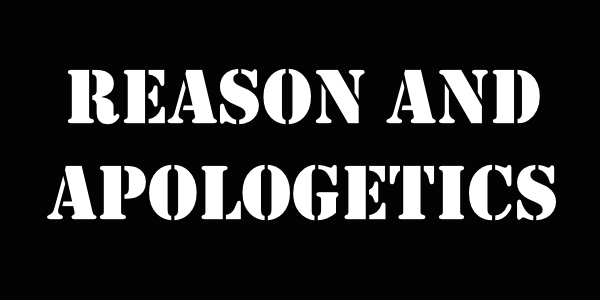 I recently saw a video in which a prominent New Testament Greek scholar, Dr. Bill Mounce, talks about what apologetics can and can’t do. The content of the video is worth considering, because Dr. Mounce takes three critical positions, all three of which are typical of what is frequently called “presuppositional” apologetics. Think about each of these positions in turn.
I recently saw a video in which a prominent New Testament Greek scholar, Dr. Bill Mounce, talks about what apologetics can and can’t do. The content of the video is worth considering, because Dr. Mounce takes three critical positions, all three of which are typical of what is frequently called “presuppositional” apologetics. Think about each of these positions in turn.
1. Apologetics is the use of logical principles to show the internal coherence of the Christian belief system (worldview), but not the objective truth of the Christian belief system.
Dr. Mounce explains that apologetics can only show that the various beliefs involved in Christianity do not contradict one another, but apologetics cannot show that Christianity is true.
This position seriously limits the value of apologetical work, because a belief system may be include only beliefs that are not internally contradictory, and yet be false. For example, suppose I believed that an all-loving, all-powerful being would not allow there to be any evil in the world. This is a false belief. But suppose I combined this false belief with a second belief, namely, that there is no God. This is another false belief. Yet, the two beliefs are consistent with one another, and may well be consistent with all of my other beliefs. Here I have produced an internally consistent, but false, belief system.
Another example is Calvinism, which, at least on a straightforward understanding (starting from the absolute sovereignty of God and concluding with the total inability of man to initiate a causal chain), is internally consistent and is still false. No proposition within the Calvinist worldview need contradict with any other proposition within the Calvinist worldview, and yet the whole system is false because it contradicts plain Bible teaching.
2. Nothing can be proven.
In fact, Dr. Mounce says, nothing can be proven by anyone at any time. This, of course, would imply that his own position cannot be proven. A logician would be scandalized by the radical claim that nothing can be proven. By saying such things about Christianity as, “I can’t prove it to you,” Dr. Mounce, like other apologists such as Ken Ham in his recent debate with Bill Nye, ((Ham told Nye that creationism could not be proven. )) has left the impression that Christianity is on weak footing; that Christian beliefs are not warranted by the sum of the evidence available to human knowers.
Perhaps Dr. Mounce means to take something like a fallibilist position and to claim this: If our standard for proof requires human beings to step outside their own experience and understand the total world situation from God’s perspective, then humans are certainly incapable of proof. However, there is a common understanding of “proof” of which human beings are capable, and it is “justification.” We invoke this conception of proof when we tell someone, “You are being unreasonable if you don’t accept how things are.” For example, God has given us perfectly sufficient evidence for believing in Him, such that anyone who fails to do so is “without excuse” (Romans 1:20-21). We can know that Christianity is true in the highest sense in which human beings can claim to know anything at all.
I am not here discussing whether fallibilism itself is a coherent or correct general theory of knowledge. I am merely suggesting that a fallibilist reading of Dr. Mounce’s remarks suggests a more charitable understanding of his presentation.
3. Apologetics does not address man’s primary problem, which is moral rather than intellectual.
In other words, Dr. Mounce says, “You can’t reason anyone into the Kingdom.” I don’t know exactly what it would mean to “reason someone into the Kingdom,” for humans cannot put anyone into the Kingdom; God adds people to the Kingdom (Acts 2:47). But I do know that presuppositionalists teach that people must have a change of heart before rational arguments can do anything for them. ((John M. Frame, “God’s Revelation Our Presupposition.” Audio Lecture. Reformed Theological Seminary. https://itunes.apple.com/us/course/gods-revelation-our-presupposition/id537705979? i=117079046&mt=2 (2012).))
Admittedly, it is difficult to disentangle the roles of the will and intellect in human action. However, one Bible example will suffice to show that Dr. Mounce is overstating his case. In the second chapter of Acts, Peter makes a number of arguments about the divinity of Christ, appealing to an audience that was opposed to him (and to Him). The arguments led those in the audience to be pricked in their hearts, and to ask, “What shall we do?” A presuppositionalist might like to suggest that the Holy Spirit directly produced this penitence, yet the penitent people had not yet received gift of the Holy Spirit (whatever we take it to be). They would not receive the Holy Spirit until after being baptized for the remission of their sins.
Each of Dr. Mounce’s positions would, if true, be devastating for the kind of apologetics that has the potency to convince nonbelievers or skeptics on any large scale. In a subsequent article, I will discuss the destructive implications of these positions for meaning in human discourse and life.